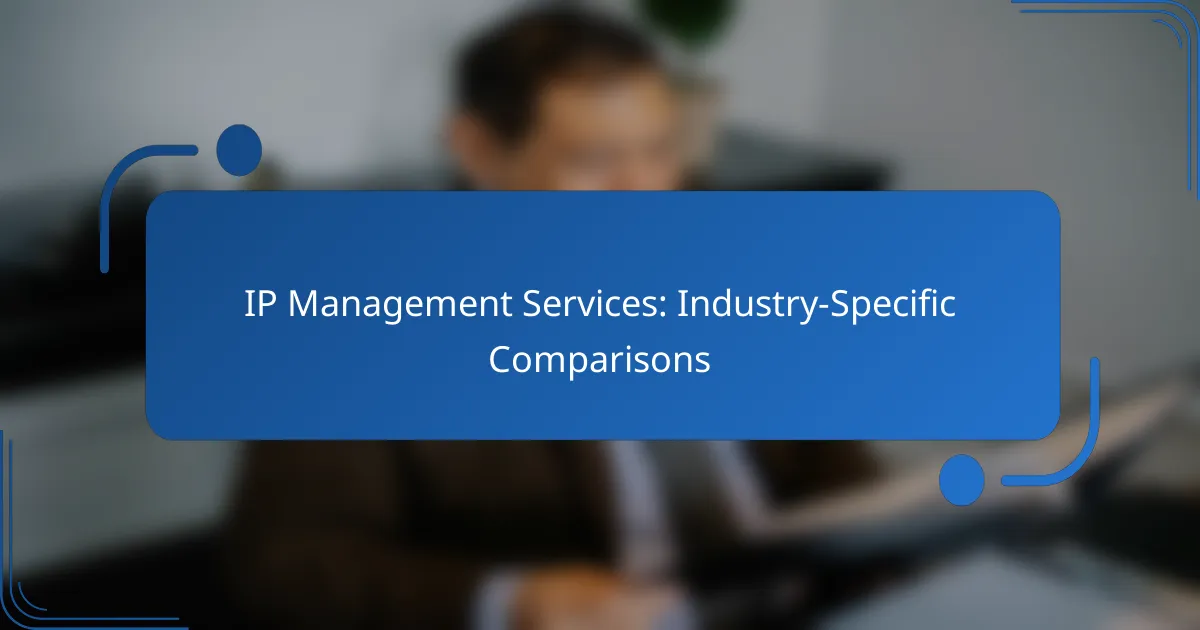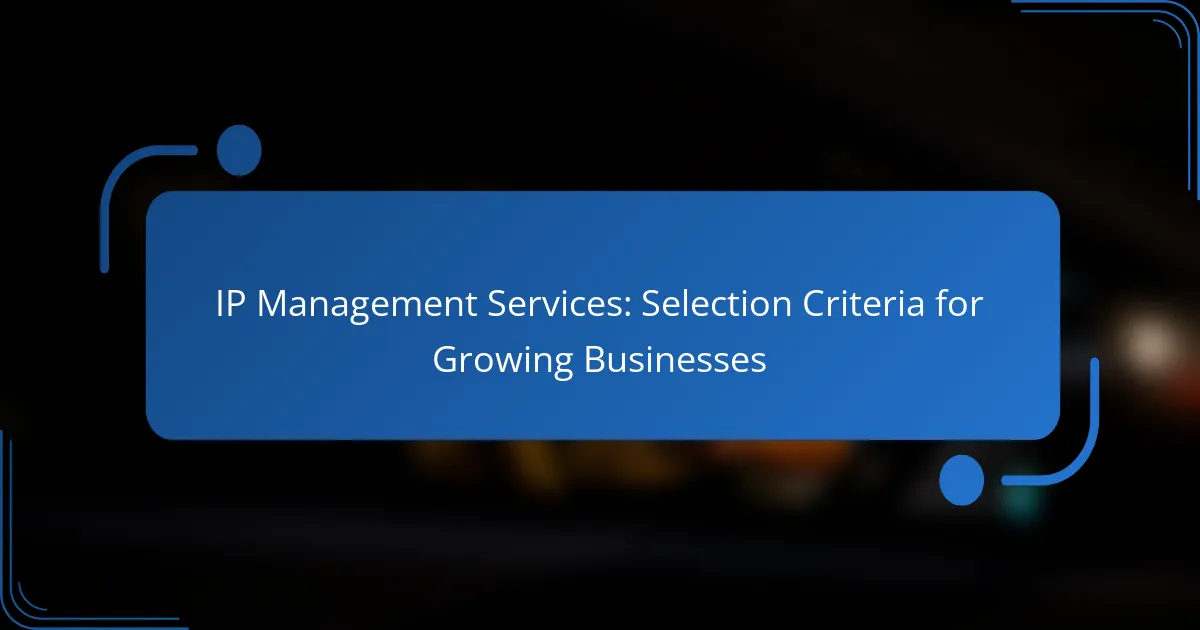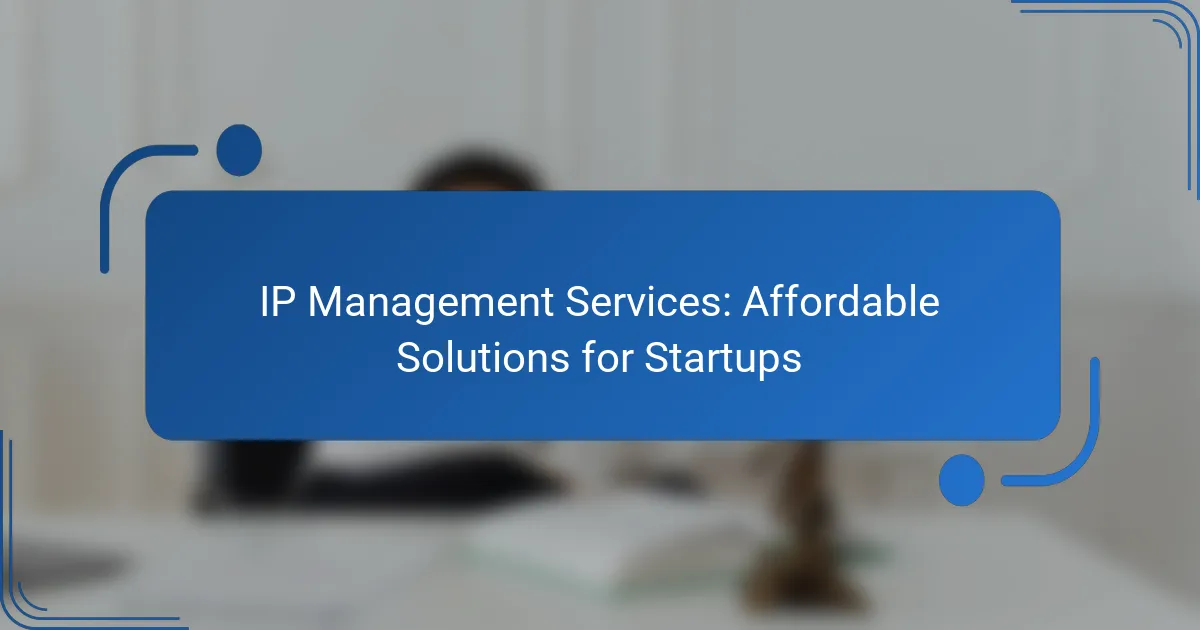Intellectual property (IP) management services are essential for businesses seeking to protect and maximize the value of their IP assets. These services, which encompass portfolio management, valuation, and strategic consulting, are tailored to meet the unique needs of different industries. By understanding the specific regulatory environments and types of intellectual property involved, companies can implement effective strategies to safeguard their innovations and drive growth.
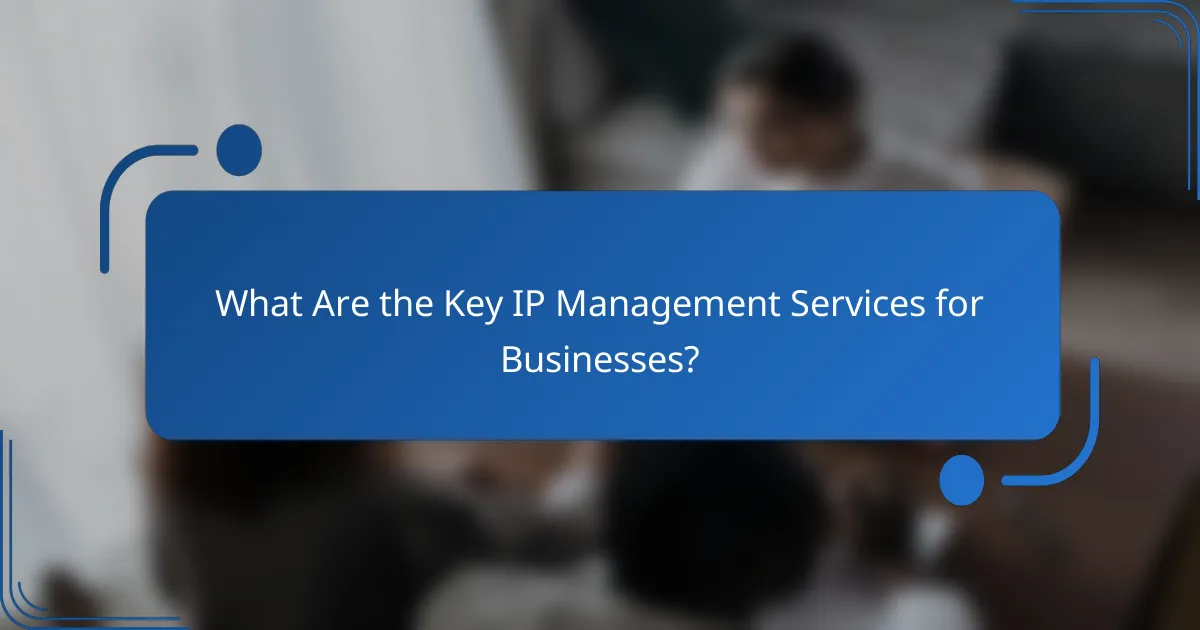
What Are the Key IP Management Services for Businesses?
Key IP management services help businesses protect, value, and leverage their intellectual property effectively. These services include portfolio management, valuation, licensing, litigation support, and strategic consulting, each tailored to enhance a company’s IP assets.
IP portfolio management
IP portfolio management involves organizing and overseeing a company’s intellectual property assets to maximize their value. This includes tracking patents, trademarks, and copyrights, ensuring they are properly maintained and renewed.
Businesses should regularly assess their portfolio to identify underperforming assets and consider divesting or enhancing them. A well-managed portfolio can lead to better strategic decisions and increased market competitiveness.
IP valuation services
IP valuation services determine the economic worth of intellectual property assets, which is crucial for mergers, acquisitions, or licensing agreements. Valuation methods may include cost, market, or income approaches, depending on the asset type and context.
Companies should engage professionals to conduct valuations periodically, especially before significant business transactions. Understanding the value of IP can inform investment decisions and enhance negotiation power.
IP licensing and monetization
IP licensing and monetization involve granting permission to third parties to use a company’s intellectual property in exchange for royalties or fees. This can create additional revenue streams and expand market reach without significant investment.
Businesses should carefully negotiate licensing agreements to protect their interests and ensure compliance with regulations. It’s essential to monitor licensees to maintain quality and brand integrity.
IP litigation support
IP litigation support provides assistance during legal disputes involving intellectual property rights. This service includes gathering evidence, expert testimony, and strategic advice to navigate complex legal frameworks.
Companies facing litigation should work with experienced legal counsel to develop a robust defense or prosecution strategy. Early intervention can often lead to more favorable outcomes and reduced costs.
IP strategy consulting
IP strategy consulting helps businesses align their intellectual property initiatives with overall business goals. Consultants analyze existing IP assets and recommend strategies for protection, enforcement, and monetization.
Companies should consider engaging consultants when entering new markets or launching innovative products. A well-defined IP strategy can enhance competitive advantage and foster innovation.
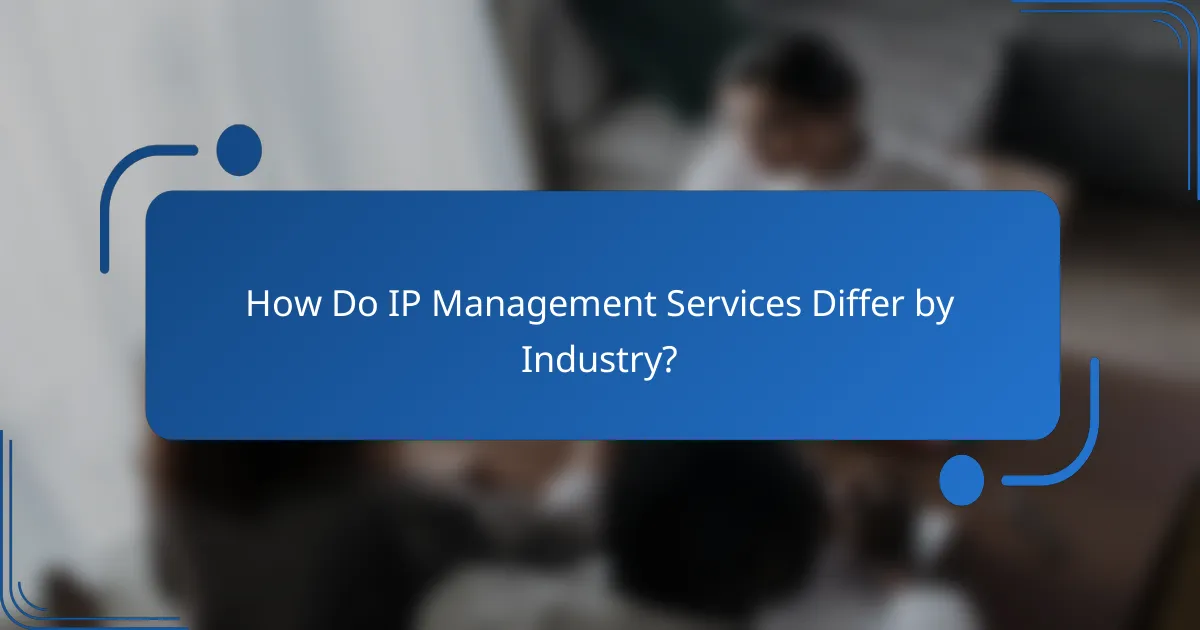
How Do IP Management Services Differ by Industry?
IP management services vary significantly across industries due to differing regulatory environments, types of intellectual property, and specific business needs. Each sector requires tailored strategies to effectively protect and leverage their intellectual assets.
Technology sector IP management
In the technology sector, IP management focuses on software patents, copyrights, and trade secrets. Companies often prioritize rapid innovation and must navigate complex patent laws to protect their inventions while ensuring compliance with regulations like the Digital Millennium Copyright Act (DMCA).
Key considerations include maintaining a robust patent portfolio and conducting regular audits to identify potential infringements. Firms should also implement strong internal policies to safeguard trade secrets, as breaches can lead to significant financial losses.
Healthcare industry IP services
Healthcare IP management emphasizes patents for pharmaceuticals, medical devices, and biotechnology innovations. This sector faces stringent regulations from agencies like the FDA, making it crucial to ensure that IP strategies align with compliance requirements.
Companies should focus on securing patents early in the development process and consider the implications of patent expiration on market exclusivity. Collaborating with legal experts can help navigate the complexities of healthcare regulations and optimize IP protection.
Manufacturing sector IP solutions
In manufacturing, IP management involves protecting designs, processes, and trademarks. Companies often deal with trade secrets related to production techniques and must be vigilant against counterfeiting and infringement.
Implementing a comprehensive IP strategy that includes regular monitoring of competitors and enforcement actions is essential. Manufacturers should also educate employees about the importance of IP protection to prevent unintentional disclosures.
Entertainment industry IP strategies
The entertainment industry relies heavily on copyrights and trademarks to protect creative works, including films, music, and digital content. With the rise of streaming services, managing IP rights has become increasingly complex, requiring careful negotiation of licensing agreements.
Producers and creators should stay informed about changes in copyright laws and consider using digital rights management (DRM) tools to safeguard their content. Additionally, understanding the global landscape of IP laws is vital for international distribution and protection.
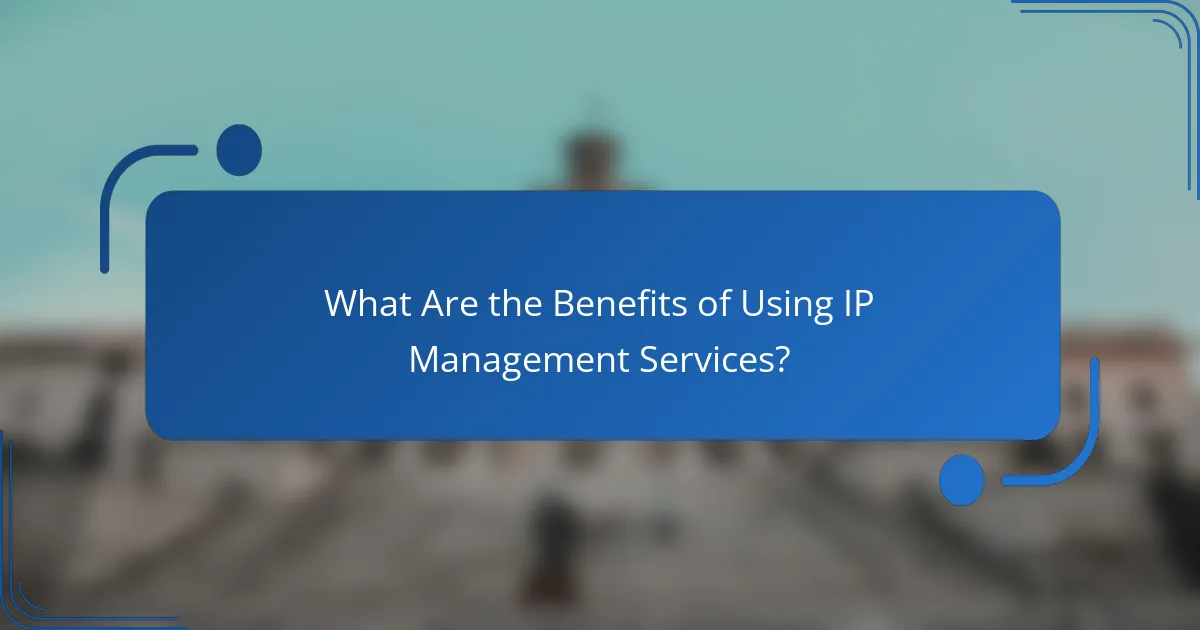
What Are the Benefits of Using IP Management Services?
IP management services provide businesses with structured support to protect and leverage their intellectual property effectively. By utilizing these services, companies can enhance their IP protection, drive revenue through licensing, minimize litigation risks, and make informed strategic decisions.
Enhanced protection of intellectual property
Using IP management services significantly strengthens the protection of intellectual property by ensuring that trademarks, patents, and copyrights are properly registered and monitored. These services often include comprehensive audits to identify potential vulnerabilities and recommend strategies to fortify IP assets.
Additionally, IP management services can help businesses stay compliant with local and international regulations, reducing the risk of unintentional infringements. Regular updates and monitoring can alert companies to potential threats, allowing for timely action to safeguard their assets.
Increased revenue through licensing
IP management services can facilitate increased revenue by identifying licensing opportunities for intellectual property. By assessing the market potential of IP assets, businesses can create licensing agreements that generate passive income streams.
For example, a software company might license its technology to other firms, while a brand can license its trademarks for merchandise. These services help negotiate favorable terms and ensure compliance with licensing agreements, maximizing revenue potential.
Reduced risk of IP litigation
Engaging IP management services can significantly reduce the risk of litigation by proactively identifying and addressing potential infringement issues. By conducting thorough searches and monitoring competitors, businesses can avoid conflicts that may lead to costly legal battles.
Moreover, these services often provide legal support to navigate disputes, ensuring that companies are prepared to defend their IP rights effectively. This proactive approach minimizes the likelihood of expensive litigation and preserves valuable resources.
Improved strategic decision-making
IP management services enhance strategic decision-making by providing valuable insights into the IP landscape. Businesses can analyze their IP portfolio and assess its alignment with overall business goals, leading to more informed decisions regarding investments and resource allocation.
Additionally, these services can offer competitive intelligence, helping companies understand market trends and competitor activities. This information is crucial for developing strategies that leverage IP assets for growth and innovation.
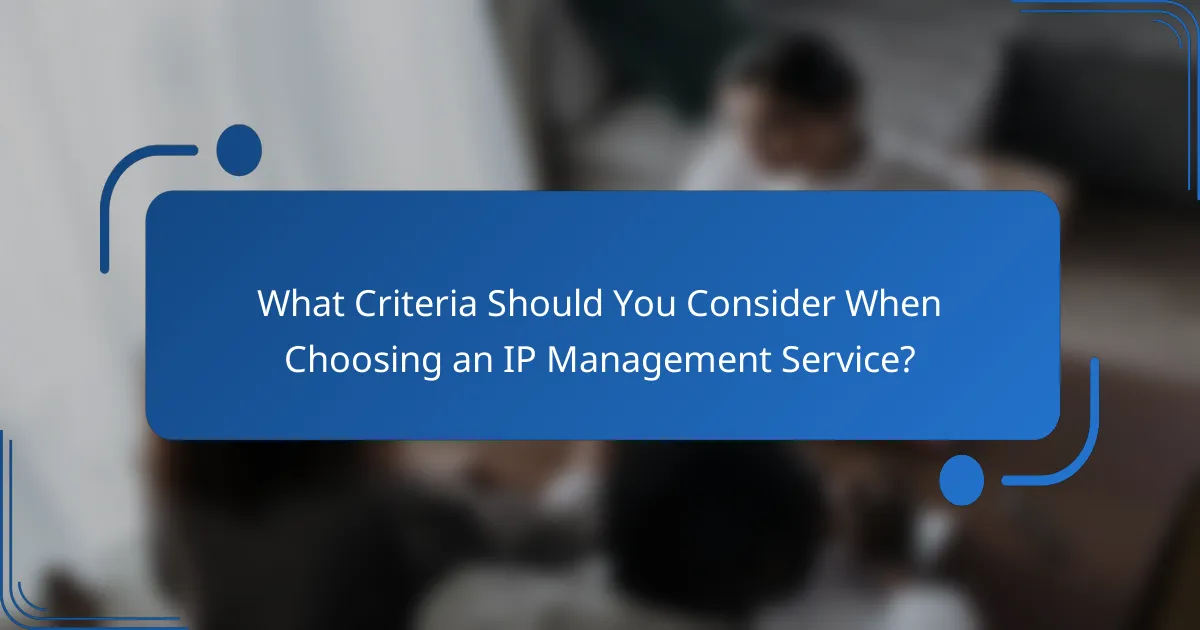
What Criteria Should You Consider When Choosing an IP Management Service?
When selecting an IP management service, consider factors such as industry expertise, service range, client feedback, and pricing models. These criteria will help ensure that the service aligns with your specific needs and goals.
Industry expertise
Industry expertise is crucial when choosing an IP management service. Look for providers with a proven track record in your sector, as they will better understand the nuances and challenges specific to your industry.
For example, a service specializing in technology patents may offer insights that a generalist provider cannot. Evaluate their experience with similar clients and the types of intellectual property they have managed.
Service range and capabilities
The range of services offered is another important criterion. Ensure the provider can handle various aspects of IP management, including patent filing, trademark registration, and IP litigation support.
Some firms may also offer additional services like portfolio management and licensing strategies. Assess whether their capabilities align with your current and future needs to avoid gaps in service.
Client testimonials and case studies
Client testimonials and case studies provide valuable insights into a provider’s effectiveness. Look for feedback from companies in your industry to gauge how well the service has performed in similar situations.
Case studies can illustrate the provider’s problem-solving abilities and success rates, helping you make a more informed decision. Seek out reviews on independent platforms to ensure authenticity.
Cost structure and pricing models
Understanding the cost structure and pricing models is essential for budgeting. Some IP management services charge flat fees, while others may use hourly rates or retainers, so clarify these details upfront.
Compare pricing across several providers to identify a fair range, but also consider the value offered. Cheaper options may not always provide the best service, so weigh cost against expertise and capabilities.

How Do Pricing Models for IP Management Services Vary?
Pricing models for IP management services can differ significantly based on the structure and needs of the client. Common models include hourly rates and flat fees, each with its own advantages and considerations.
Hourly rates vs. flat fees
Hourly rates charge clients based on the actual time spent on IP management tasks, which can be beneficial for projects with unpredictable scopes. This model allows for flexibility, as clients only pay for the hours worked, but it may lead to higher costs if the project extends longer than anticipated.
Flat fees, on the other hand, provide a predetermined cost for specific services, offering clients budget certainty. This model is often preferred for routine tasks like trademark registrations or patent filings, where the scope is well-defined. However, clients should ensure that the flat fee covers all necessary services to avoid unexpected expenses.
When choosing between these models, consider the complexity of your IP needs and the predictability of the workload. For example, if you anticipate frequent changes or additional services, hourly rates might be more economical. Conversely, if you have a clear project scope, a flat fee could save you money in the long run.
